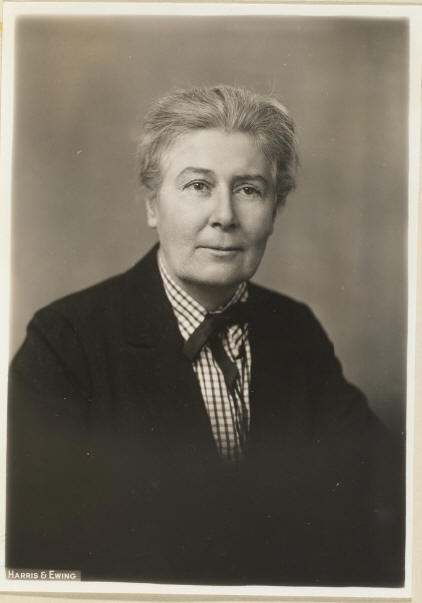Queer Places:
Oak Hill Cemetery
Washington, District of Columbia, District of Columbia, USA
 Ellen La Motte (November 27, 1873 – March 2, 1961) was a nurse and author. She
was a member of the Heterodoxy Club. During her time in Paris during the war
La Motte formed a close friendship with the American expat writer Gertrude
Stein. Researchers have speculated that Ernest
Hemingway's influential unadorned style may have been influenced by La
Motte's own writing, through Stein's mentoring.[2]
Ellen La Motte (November 27, 1873 – March 2, 1961) was a nurse and author. She
was a member of the Heterodoxy Club. During her time in Paris during the war
La Motte formed a close friendship with the American expat writer Gertrude
Stein. Researchers have speculated that Ernest
Hemingway's influential unadorned style may have been influenced by La
Motte's own writing, through Stein's mentoring.[2]
Ellen Newbold LaMotte was born in Louisville, Jefferson County, Kentucky, the daughter of Ferdinand LaMotte
(1844–1917) and
Ellen Newbold (1847–1926).

She was a 1900 graduate of the Training School of John Hopkins Hospital, one
of the three leading nursing schools in the United States. After graduation
she became a member of the Instructive Visiting Nurse Association of
Baltimore. She organized the Public Health Nursing Staff of Baltimore and was
the Superintendent of the Tuberculosis Division of the Health Department from
1910 to 1913. She was the first to understand that tuberculosis patients
needed to be segregated. In 1914 she published The Tuberculosis Nurse: Her
Function and Her Qualifications: A Handbook for Practical Workers in the
Tuberculosis Campaign. She believed nurses should have the autonomy to decide
on a course of action independently. Before the United States entered World
War I she traveled to Europe to volunteer her nursing skills. She first worked
at the American Hospital in Neuilly. She met Mary Borden, the daughter of an
American businessman and the wife of an English merchant, who ran a field
hospital in Belgium. LaMotte joined her and served as a nurse with the French
Army from 1915 to 1916. During the war she wrote about her experiences and the
articles were published in the Atlantic Monthly. They included The Backwash of
War: The Human Wreckage of the Battlefield as Witnessed by an American
Hospital Nurse in 1916. Her book was banned by the United States Government in
1918 as it graphically revealed the horrors of the first modern war. After the
war she traveled to China, Japan, French Indochina, and Siam. She published
six books: Peking Dust in 1919; Civilization: Tales of the Orient in
1919; Snuffs and Butters in 1925; Opium Monopoly in 1920; Ethics of Opium in
1922 and Opium in Geneva: Or How the Opium Problem is Handled by the League of
Nations in 1929. A common theme in her books was how foreigners took advantage
of the native population and victimized them.
Her 1922 passport application stated that she resided in France from June 1913
to 1916 and in the Far East from 1916 to July 1917. The application also
stated she resided in Europe from October 1920 to November 1921 and London was
her temporary residence. The Chinese Nationalist government awarded her the
Lin Tse Hsu Memorial Medal in 1930.[3]
My published books:


BACK TO HOME PAGE

 Ellen La Motte (November 27, 1873 – March 2, 1961) was a nurse and author. She
was a member of the Heterodoxy Club. During her time in Paris during the war
La Motte formed a close friendship with the American expat writer Gertrude
Stein. Researchers have speculated that Ernest
Hemingway's influential unadorned style may have been influenced by La
Motte's own writing, through Stein's mentoring.[2]
Ellen La Motte (November 27, 1873 – March 2, 1961) was a nurse and author. She
was a member of the Heterodoxy Club. During her time in Paris during the war
La Motte formed a close friendship with the American expat writer Gertrude
Stein. Researchers have speculated that Ernest
Hemingway's influential unadorned style may have been influenced by La
Motte's own writing, through Stein's mentoring.[2] 

